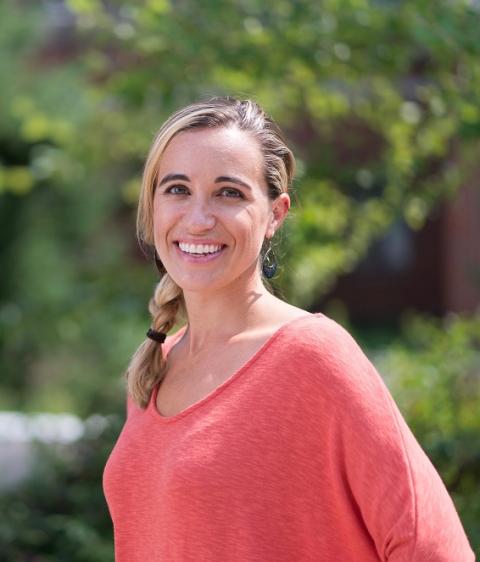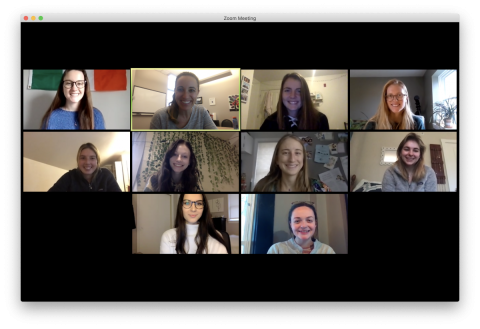Jill Thorson is an assistant professor in the Department of Communication Sciences and Disorders at the University of New Hampshire. Below is a correspondence with Dr. Thorson about her own research and her mentoring experiences with undergraduate students.
Inquiry: What is your research focus? Did your undergraduate studies point you toward it? What interests you most about it?

Jill Thorson
My research focuses on how children learn language, and how we as researchers can identify differences in development across unique populations, such as a child with autism spectrum disorder (ASD). I am particularly interested in the melody and rhythm of speech, called prosody, which is critical in early speech and language acquisition. Thinking back, I have always enjoyed learning about languages, taking classes in Spanish at a rural New Hampshire high school as my only exposure until I went to college. In my first semester of college, I took a linguistics course on a whim, along with others in international politics, math, and Spanish. I remember wanting to major in law when I first arrived at college, but I was captivated by that class People and Their Language. It explored how language is central to culture, identity, and learning. I went into the class not knowing what the scientific study of language was, and I left it profoundly affected by the power that language has for an individual or group.
During my time as an undergraduate, I took every class I could in both linguistics and Spanish. I learned about language sound systems, the meaning of words, sentence structure, and how we use language socially. When I studied abroad in Mexico and then Spain, I took courses at the local university in Spanish linguistics. During my sophomore year, I decided to switch campus jobs to one that would support my interests. I was a research assistant for five years and learned about psycholinguistics, eye-tracking to examine how the brain processes language, and research design. My interest in prosody (the melodic and rhythmic patterns of language) evolved over this time and became the focus for my senior year honors thesis. Because I loved it so much and realized there was so much more to learn, I went on to complete a master’s in linguistics, received a Fulbright Fellowship to Barcelona for two years to work in a research lab, and obtained my doctorate in child language acquisition. My work now focuses on how our knowledge of language development can aid in early assessment and diagnosis of children with ASD or a speech disorder, as well as the best methods that we can use to help in treatment.
Looking back, I can see how each experience supported what I do now. The path that began during my undergraduate years led me to a field that focuses on helping people communicate. I have never stopped enjoying the process of coming up with a question and then testing it in the real world. Now I am lucky enough to be a mentor for undergraduate students learning to ask their own questions. Student passion for research is truly what drives my lab at UNH, the Communication, Acquisition, and Translational Studies Lab (CAT Lab).
Inquiry: What is the purpose of a mentoring relationship? What should the student and you gain from it?
Mentoring is a dynamic relationship that supports students in finding their next step, whether that is in their research or career. My role as a mentor varies with the needs of the individual student. Undergraduates are each at their own point in their path forward and each has a style that is unique to them. Some students come to me with a research question already formed, and my role is to guide them in study design. Others may come with a lot of enthusiasm and need support in how to channel that enthusiasm into a more targeted question. In a case like that, we work together to narrow down their interests, reading current articles in the field, and going back and forth with ideas. For every kind of student, my goal is to keep that spark ignited that drove them to want to participate in research. And it works both ways! Working with students gives me energy in a field that is constantly evolving. With each new student perspective, I get to see the world of child language development for the first time again. Each student’s unique perspective and research question opens me up to new angles of research. Overall, a mentoring relationship also models flexibility, accountability, and goal setting, and should help the student gain confidence as well as an appreciation for the complexities of research.
Inquiry: Please describe one or two memorable mentoring experiences or mentees.
Each student that I have worked with has provided a rewarding experience. One story comes from before I began at UNH in the fall of 2017, when a sophomore reached out to me to join my lab—before it had even started up! Allison’s interests aligned with my own and she was excited to see what research looked like in child language development. She had an infectious enthusiasm in the lab and when she began in a speech-language pathology master’s program after graduation, she emailed to share how her research exposure gave her a leg up in her classes and that the research lab experience helped her when she began teaching an evening class in the field. It was so rewarding, for both of us, to see her research experience translate so well to her research and career after graduation.

Jill Thorson with CAT lab members in fall 2020. Top row: Grace O'Halloran, Dr. Jill Thorson, Ashlyn Murphy, Lydia Sack; middle row: Isabelle Danahy, Ivy Missaggia, Kaleigh Samowski, Alysa Emerson; bottom row: Gabrielle Gagnon, Rachel Courter. Not pictured, joined in spring 2021: Katherine Stariknok, Piper MacLean.
Another student, Serena, completed INCO Research Experiences, a Summer Undergraduate Research Fellowship (SURF), and an honors thesis with me in the CAT Lab. She was highly motivated, driven, and a fantastic writer. She presented her work at the Undergraduate Research Conference (URC) and had her work accepted to the American Speech-Language-Hearing Association national convention. It was amazing to see how much a motivated student can accomplish during their time at UNH.
Finally, Grace came to my lab as a first-year student and is the first student I have had the pleasure to accompany across her entire four years at UNH. We share a love of other cultures and particularly a passion for the Spanish language. Our conversations about studying abroad, working with children, and cultural differences truly highlight why I became a teacher. Grace has completed several INCOs in the lab and is currently analyzing Spanish language data to present at the URC this spring. It has been amazing to be a part of her undergraduate experience.
I am lucky to have been able to work with these bright young women, encouraging them to ask interesting questions, explore these questions through careful and deliberate research, and to present their work and thrive in their life at and beyond UNH.
Inquiry: Please describe any difficulties or problems you have had in mentoring undergraduates.
I find that students can be discouraged if they are not able to immediately come up with a research idea. We talk (a lot) and I remind them that one of the hardest parts of the research process is finding a great question; it’s something that doesn’t just turn on like a lightbulb but is something you have to work at. Giving ourselves time to slow down and think is a rarity in our world today, where most things come to us instantaneously at our fingertips. I listen to my mentees and we talk about how this period of reflection and brainstorming can actually be the hardest part of research. Creativity is not spontaneous, and our brains need time to sit and marinate with all of the information.
This past year brought forth a new set of difficulties for everyone. COVID-19 derailed a lot of plans, including undergraduate research plans that had been in the works for months, if not years. Pivoting and switching to new topics is not easy. For some students, research acted as an anchor during a period of unknowns. Several students took this as an opportunity to slow down and read more articles in the field. For others under a lot of stress, this was the extra part of their schedule that was more negotiable. Due to this, I counseled one student to take a semester away from the lab in order to focus on their coursework and their own mental health. I’ve learned that the best mentoring is supporting students to sometimes make difficult decisions, whether it be in terms of their research goals or their own life trajectory.
Inquiry: What advice or tips would you give a faculty member new to undergraduate mentoring?
Flexibility. Each person is different, and your own mentoring style will change to adapt to the needs of your students. Where one student may need a lot of support, another might need less. Where some may want to share details about their personal life, others may not. Be open to the individual, be receptive to growing together, and above all remember what it felt like to be just starting out.
Copyright 2021, Erin Trainer
